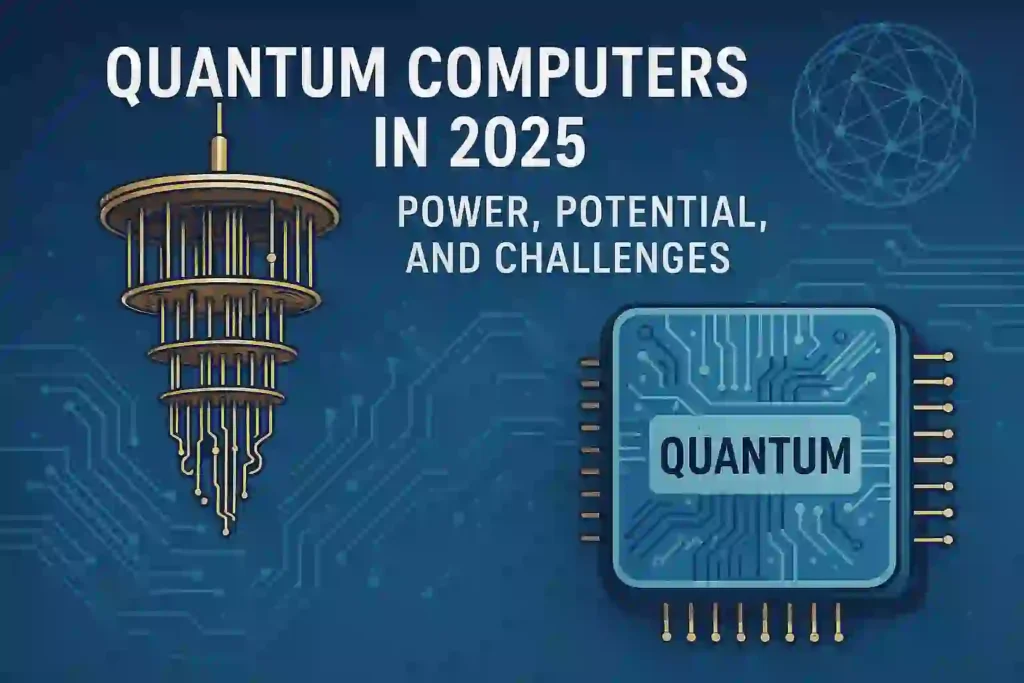|
Getting your Trinity Audio player ready...
|
Quantum Computers in 2025: Power, Potentia and Challenges
As we near 2025, a big question emerges: How will quantum computing change the tech world? The idea of quantum computers solving problems we can’t now is exciting. It also brings big changes for future technology.

Table of Contents
ToggleQuantum computing is set to change many fields, like cryptography and drug discovery. It uses its huge power to solve complex problems. But, we must first solve big technical hurdles.
Key Takeaways
- Quantum computing is set to change many industries.
- Big technical challenges need to be solved.
- Quantum computing will boost our computing power.
- The future of tech depends a lot on quantum computing.
- It could be used for things like cryptography and drug discovery.
The Current State of Quantum Computing
Quantum computing is rapidly evolving thanks to major tech leaps. Quantum computing trends are fueled by big investments in research. This has led to big wins in areas like quantum supremacy.
Major Breakthroughs in Recent Years
Recently, quantum computing has made huge strides. Google’s Sycamore processor is a prime example. It showed it can do complex tasks that classical computers can’t.
Other big wins include better quantum error correction and more stable qubits. These are key for making quantum computing useful in real life.
Leading Companies and Research Institutions
Top companies and research places are leading in quantum computing. IBM, Google, and Microsoft are working on quantum tech. MIT and Stanford are pushing the limits with quantum algorithms and theory.
Working together, these groups are creating a fast-paced environment. This is speeding up the growth of quantum computing tech.
READ ALSO – How to Protect Yourself from Gmail AI-Driven Phishing Attacks: A Complete Guide
Quantum Computing Fundamentals
Quantum computing is all about understanding qubits, superposition, and entanglement. Qubits are the core of quantum computing. They are different from the bits we use in computers today.
Qubits vs Classical Bits
Classical bits are just 0 or 1. But qubits can be more than one thing at once. This is thanks to superposition.
This means a single qubit can handle many possibilities at the same time. Unlike classical bits, which can only be one thing.
- Qubits can represent both 0 and 1 at the same time.
- Multiple qubits can be entangled, meaning their properties are connected even when separated.
Quantum Principles: Superposition and Entanglement
Superposition lets a qubit be in many states. Entanglement links qubits so that changing one instantly changes the other, no matter the distance. These are key to quantum computing’s strength.
Quantum Computers in 2025: Power, Potencial, and Challenges
As we get closer to 2025, quantum computing is set for big changes. People are hoping for major improvements in both hardware and software. These could change how we solve complex problems.
Expected Computational Capabilities
By 2025, quantum computers will be much faster and more powerful. They will be able to do things that classical computers can’t. This is thanks to better qubit technologies and quantum algorithms.
Quantum simulations will also get better. They will help us understand complex quantum systems better. This is good news for fields like materials science and drug research.
Quantum Advantage Milestones
A big goal for quantum computers is to show quantum advantage. This means beating a classical computer at something. By 2025, we hope to see big steps towards this goal.
When we reach quantum advantage, it will prove quantum computing’s worth. It will also open doors for its use in many industries. It will change how we tackle tough problems.
READ ALSO – How to Avoid Scams on Mobile Payment Apps in 2025
Hardware Advancements Expected by 2025
By 2025, quantum computing hardware is set to see big leaps forward. These improvements will come from better qubit technologies, scaling up, and fixing errors.
Qubit Technologies and Scaling
Qubit tech is key for quantum computing to grow. By 2025, we’ll see qubits last longer and be made in bigger numbers. Superconducting qubits and ion trap qubits are leading the charge.

Error Correction Improvements
Fixing errors is a big challenge in quantum computing. New quantum error correction codes will make quantum computers more reliable. By 2025, these updates will make quantum computing systems stronger and more dependable.
| Technology | 2025 Expectations | Benefits |
|---|---|---|
| Superconducting Qubits | Improved coherence times | Better scalability |
| Ion Trap Qubits | Enhanced precision | Higher fidelity operations |
| Quantum Error Correction | Advanced error correction codes | More reliable computations |
Quantum Software Development Trajectory
The path of quantum software development is set to change how we tackle complex problems. Quantum computing is growing, and we need better software to use its power.
Quantum algorithms are key to this progress. They’re made to solve problems that old computers can’t handle well.
Advancements in Quantum Algorithms
By 2025, quantum algorithms will get much better. They’ll help us do simulations and optimizations faster. The main areas to watch include:
- Improving algorithm efficiency
- Developing new quantum algorithms for specific applications
- Enhancing algorithm robustness against errors
Programming Languages and Development Tools
Creating new programming languages and tools is vital for quantum software. Languages like Q# and Qiskit help make quantum algorithms.
A table below shows popular quantum programming languages and their features:
| Language | Primary Use | Notable Features |
|---|---|---|
| Q# | Quantum algorithm development | High-level abstraction, integration with Microsoft Quantum Development Kit |
| Qiskit | Quantum circuit construction and execution | Open-source, extensive library of quantum algorithms and tools |
| Cirq | Near-term quantum computing | Flexible circuit construction, integration with Google’s quantum hardware |
As quantum software keeps getting better, we’ll see more advanced tools and languages. This will help quantum computing grow faster.
READ ALSO – Why Is My iPhone Battery Draining So Fast? 15 Real Fixes
Potential Applications Across Industries
Quantum computing is changing the game in many fields. It’s making waves in healthcare, finance, materials science, and manufacturing. This technology is set to transform how we work and live.
Pharmaceutical and Healthcare Breakthroughs
Quantum computing is set to change the pharmaceutical world. It can simulate complex molecular interactions. This means finding new drugs and personalized medicine could become easier.
For example, quantum computers can sift through huge data sets. They can find drug candidates and predict how well they’ll work.
Financial Modeling and Optimization
In finance, quantum computing helps with investment portfolios and risk management. It uses quantum algorithms to analyze complex models. This gives insights into market trends and future changes.
This leads to smarter investment choices and better risk handling. It’s a game-changer for financial planning.
Materials Science and Manufacturing
Quantum computing is also a game-changer for materials science. It simulates material properties at the atomic level. This could lead to new materials with special properties.
Imagine materials that are superconductors or nanomaterials. These advancements could make products more efficient and sustainable.

| Industry | Potential Applications | Benefits |
|---|---|---|
| Pharmaceutical and Healthcare | Drug discovery, personalized medicine | New treatments, improved patient outcomes |
| Financial | Portfolio optimization, risk management | Better investment decisions, reduced risk |
| Materials Science and Manufacturing | New materials development, process optimization | Innovative products, improved efficiency |
Remaining Technical Challenges
Quantum computing has made big strides, but it’s not there yet. It faces many technical hurdles to reach its true power. Making better quantum systems is hard because of problems with their stability and how big they can get.
Quantum Decoherence Issues
Quantum decoherence is a big problem. It’s when qubits lose their quantum magic because of the outside world. This makes them fail in calculations. Scientists are working on ways to fix this, like error correction techniques and improved qubit designs.
| Method | Description | Potential Impact |
|---|---|---|
| Error Correction Techniques | Implementing codes that can detect and correct errors caused by decoherence. | Significant reduction in error rates. |
| Improved Qubit Designs | Developing qubits that are less susceptible to environmental noise. | Enhanced stability of quantum systems. |
Scalability Obstacles
Scaling up quantum systems is another big challenge. As more qubits are added, it gets harder to control them. Scalability obstacles include better control electronics and quantum processor designs.
Fixing these problems is key for quantum computing to move forward. By solving decoherence and scalability issues, scientists can make quantum computers more powerful and useful.
READ ALSO – Why is My iPhone Getting Hot? 11 Reasons and Fixes
The Global Quantum Computing Race
Quantum computing is now a key area of competition. Countries and companies are racing to be the leaders. They see quantum computing as a way to change many industries, from medicine to finance.
U.S. Quantum Initiatives
The U.S. is leading in quantum computing research. It has big investments from both the government and private companies. The National Quantum Initiative Act is one effort to speed up quantum tech development.
China’s Quantum Ambitions
China is also making big moves in quantum computing. It’s focusing on achieving quantum supremacy. China’s efforts are supported by a lot of government money and careful planning.
European and Other International Efforts
Europe and other areas are also working hard on quantum computing. The European Quantum Flagship is a key program. It aims to boost innovation and teamwork across Europe.
| Region | Key Initiatives | Investment |
|---|---|---|
| U.S. | National Quantum Initiative Act | Significant government and private investment |
| China | Quantum supremacy projects | Substantial government funding |
| Europe | European Quantum Flagship | Multi-billion euro investment |
Economic Impact of Quantum Computing by 2025
The economic effects of quantum computing by 2025 will be wide-ranging and significant. As quantum tech improves, it will likely boost economic growth in many ways.
Market Size Projections
The market for quantum computing is set to expand greatly by 2025. Market research shows it could hit billions of dollars in value. This growth will be driven by rising demand from sectors like pharmaceuticals, finance, and materials science.
- Quantum computing hardware is expected to be a major contributor to this growth.
- Software and services related to quantum computing will also see significant expansion.
Industry Transformation Predictions
Quantum computing is set to transform various industries by solving complex problems that classical computers can’t. This change will lead to major breakthroughs in drug discovery, optimizing complex systems, and developing new materials.
- Pharmaceutical companies will benefit from faster drug discovery processes.
- Financial institutions will use quantum computing for more accurate risk analysis and portfolio optimization.
As these industries start using quantum computing, we’ll see big economic gains. These include increased efficiency, new business models, and the creation of new jobs.
READ ALSO – How to See When Someone Was Last Active on Snapchat
Investment and Funding Landscape
Venture capital trends and government funding are key in the quantum computing industry’s growth. The money coming in from different places is vital for developing and using quantum tech.
Venture Capital Trends in Quantum Computing
Recently, venture capital in quantum computing has grown a lot. Investors see quantum tech as a game-changer for many industries. Reports show that funding for quantum startups has hit new records, with big investors putting in a lot of money.

| Year | Venture Capital Investment | Number of Deals |
|---|---|---|
| 2020 | $200M | 15 |
| 2021 | $400M | 25 |
| 2022 | $600M | 35 |
Government Funding Programs
Government funding is also important for quantum computing. Governments worldwide are starting programs to help with quantum tech research and development. These efforts give financial help and bring together schools, businesses, and government.
The U.S. National Quantum Initiative has given a lot of money for quantum research. The European Union’s Quantum Flagship program is also investing a lot, aiming to make Europe a top player in quantum tech.
Quantum Computing vs. Classical Computing in 2025
By 2025, quantum computing will start to play a big role next to classical computing. It will change how we solve complex problems. Classical computers will keep doing everyday tasks, but quantum computers will tackle big challenges.
Complementary Roles
Quantum and classical computing will work together. Classical computers will handle simple tasks like browsing the web. Quantum computers will solve tough problems in areas like cryptography and materials science.
Hybrid Computing Models
Hybrid models that mix quantum and classical computing will appear. They will use classical computers for prep and post work. Quantum computers will handle the complex calculations.
| Computing Paradigm | Strengths | Applications |
|---|---|---|
| Classical Computing | Reliability, Maturity | Everyday tasks, Web browsing |
| Quantum Computing | High computational power for specific tasks | Cryptography, Materials Science, Optimization |
| Hybrid Computing | Combines classical and quantum strengths | Complex simulations, Data analysis |
Conclusion
Looking ahead to 2025, quantum computing is set for big leaps. Quantum computers could change many industries, like medicine, finance, and materials science. They promise to bring new breakthroughs.
The future of quantum computing looks bright. Thanks to advancements in qubits, error correction, and software, quantum computers are ready to make a big difference. This is setting the stage for a major impact.
But, there are challenges like quantum decoherence and scaling up. Despite these, the progress in recent years is clear. Top companies and research groups are working hard to overcome these hurdles.
We can expect big changes as quantum computers evolve. This will lead to a new era of computing, changing industries and opening new doors. Quantum computing is set to be a key player in the future of tech.
FAQ
What is the expected impact of quantum computers on the pharmaceutical industry by 2025?
Quantum computers are set to change the pharmaceutical world. They will help simulate complex molecular interactions. This could lead to major breakthroughs in drug discovery and development.
How will quantum computing change the field of materials science?
Quantum computing will let researchers study materials at the atomic level. This could lead to finding new materials with special properties and uses.
What are the major challenges facing the development of quantum computers?
The big hurdles include beating quantum decoherence and scaling up qubits. Also, creating strong error correction methods is a challenge.
How will quantum computing influence financial modeling and optimization?
Quantum computing will make financial modeling faster and more precise. This will help with risk analysis, portfolio optimization, and pricing derivatives better.
What is the current state of quantum software development?
Quantum software development is moving fast. There’s big progress in quantum algorithms, programming languages, and tools.
How will quantum computing affect the global economy by 2025?
Quantum computing is expected to greatly impact the global economy. It will drive innovation and change industries like healthcare, finance, and materials science.
What are the leading companies and research institutions driving quantum computing forward?
IBM, Google, and Microsoft are leading the charge. So are research places like MIT and Stanford.
What is the role of government funding in the development of quantum technology?
Government funding is key for quantum tech research and development. It drives innovation and speeds up quantum computing adoption.
How will quantum computing and classical computing coexist in 2025?
Quantum and classical computing will likely work together. Hybrid models will use the best of both worlds.
What are the predictions for the market size of quantum computing by 2025?
The quantum computing market is expected to grow a lot by 2025. This growth will come from more industries using it and tech advancements.







1 thought on “Quantum Computers in 2025: Power, Potentia and Challenges”
Very good 👍👍